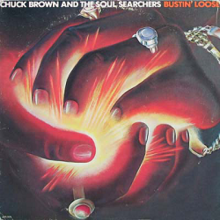From Wikipedia, the free encyclopedia
1979 studio album by Chuck Brown
| Bustin' Loose |
|---|
 |
|
| Released | 1979 |
|---|
| Studio | Sigma Sound, Philadelphia, Pennsylvania |
|---|
| Genre | |
|---|
| Length | 39:06[1] |
|---|
| Label | Source, MCA |
|---|
| Producer | - James Purdie
- Logan H. Westbrooks
|
|---|
|
|
|
|
|
- "Bustin' Loose"
Released: October 1978
- "Never Gonna Give You Up"
Released: 1979
- "Game Seven"
Released: April 1979
|
|
|
Bustin' Loose is a studio album released in 1979 by the Washington, D.C.–based go-go band Chuck Brown & the Soul Searchers.[1][6][7] The album includes the charting single and one of the all-time classic go-go songs "Bustin' Loose",[8] along with a remake of the classic Jerry Butler's soul ballad "Never Give You Up" from the 1968 album The Ice Man Cometh.[1]
Bustin' Loose became Brown's first album to chart on the Billboard 200, where it peaked at number 31. On August 10, 1979, Bustin' Loose was certified gold by the Recording Industry Association of America, for shipments of 500,000 copies in the United States.[9] The single "Bustin' Loose" was also certified gold by the RIAA on March 14, 1979.[9]
| Title | Writer(s) |
|---|
| 1. | "Bustin' Loose" | Chuck Brown | 7:39 |
|---|
| 2. | "Never Gonna Give You Up" | | 5:40 |
|---|
| 3. | "If It Ain't Funky" | Chuck Brown | 6:01 |
|---|
| 4. | "I Gotcha Now" | - Chuck Brown
- John "JB" Buchanan
- Leroy Fleming
- Curtis Johnson
- Donald Tillery
- Jerry Wilder
| 5:03 |
|---|
| 5. | "Could It Be Love" | - Shirley Chevalier
- James Purdie
| 5:19 |
|---|
| 6. | "Games Seven" | - Chuck Brown
- John "JB" Buchanan
- Leroy Fleming
- Curtis Johnson
- Donald Tillery
- Jerry Wilder
| 6:13 |
|---|
| 7. | "Berro E Sombaro" | - Chuck Brown
- John "JB" Buchanan
- Leroy Fleming
- Curtis Johnson
- Donald Tillery
- Jerry Wilder
| 3:11 |
|---|
| Total length: | 39:06 |
|---|
- Chuck Brown – lead vocals, electric guitar
- Jerry Wilder – bass guitar, backing vocals
- Gregory Gerran – congas, percussion
- Ricky Wellman – drums
- Leroy Fleming – tenor saxophone, flute, timbales, backing vocals
- Skip Fennell – keyboards
- Curtis Johnson – organ
- John Buchanan – keyboards, trombone, backing vocals
- Donald Tillery – trumpet, tambourine, backing vocals
- Leron Young – lead guitar on "Never Gonna Give You Up" and "Could It Be :ove"
- Don Renaldo – strings on "Never Gonna Give You Up" and "Could It Be Love"
- Lincoln Ross – trombone on "Bustin' Loose"
- Technical
- Logan H. Westbrooks - executive producer
- Carl Paruolo - engineer
- ^ a b c d Henderson, Alex. Chuck Brown & the Soul Searchers: Bustin' Loose > Review at AllMusic. Retrieved 19 August 2016.
- ^ "Chuck Brown Album Releases & Reviews". ARTISTdirect. Retrieved 3 November 2016.
- ^ Christgau, Robert (1981). "Consumer Guide '70s: B". Christgau's Record Guide: Rock Albums of the Seventies. Ticknor & Fields. ISBN 089919026X. Retrieved February 22, 2019 – via robertchristgau.com.
- ^ Graff, Gary; Freedom du Lac, Josh; McFarlin, Jim (1998). "A-Z Guide to R&B Acts: Chuck Brown & the Soul Searchers". In Terrell, Tom (ed.). musicHound R&B: The Essential Album Guide (1st ed.). Detroit: Visible Ink Press. p. 78. ISBN 1-57859-026-4.
- ^ Larkin, Colin (1998). The Virgin Encyclopedia of R&B and Soul. Virgin. p. 40.
- ^ Lornell, Kip; Stephenson, Jr., Charles C. (2001). The Beat: Go-Go's Fusion of Funk and Hip-Hop. Billboard Books. p. 252. ISBN 0-8230-7727-6.
- ^ Nnamdi, Kojo (February 14, 2014). "From Go-Go's Heyday to Today: One Musician's Love Affair With D.C. Music". The Kojo Nnamdi Show. WAMU. Retrieved 2 December 2016.
- ^ Thompson, Dave (2001). "Part Four: The New School". Funk: Third Ear - The Essential Listening Companion (1st ed.). San Francisco: BackBeat Books. pp. 297–299. ISBN 0-87930-629-7.
- ^ a b "Gold & Platinum - RIAA". RIAA. Retrieved 4 November 2016.
|
|---|
|
| Studio albums | |
|---|
| Live albums | |
|---|
| Singles | |
|---|
| Compilation albums | |
|---|
| Related articles | |
|---|
|

